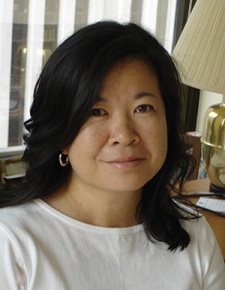
profiles |
Debra Liang-Fenton ’87
by Emily Groff
 Debra
Liang-Fenton, Class of 1987, can trace her interest in human rights and
democracy issues to her youth in the 1980s. She attended Trinity at a time
when international human rights issues were gaining increasing importance in
the United States. “The situation in South Africa became more publicly
known,” she recalls, “ and human rights and democracy movements were really
gaining momentum in Eastern Europe and in the former Soviet Union, and also
in China. And in the late 1980s, the U.S. Congress passed the important
Civil Rights Restoration Act.”
Debra
Liang-Fenton, Class of 1987, can trace her interest in human rights and
democracy issues to her youth in the 1980s. She attended Trinity at a time
when international human rights issues were gaining increasing importance in
the United States. “The situation in South Africa became more publicly
known,” she recalls, “ and human rights and democracy movements were really
gaining momentum in Eastern Europe and in the former Soviet Union, and also
in China. And in the late 1980s, the U.S. Congress passed the important
Civil Rights Restoration Act.”
At Trinity, Liang-Fenton majored in political science. She fondly remembered her adviser, Prof. Albert Gastmann, who “inspired me to look more deeply at geopolitical dynamics.” She adds, “I’ve been interested in the dynamics that enable [democratic processes] to take shape and transform societies ever since.”
After graduation, Liang-Fenton went to work advocating for human rights and democracy for people around the world. She was project officer for the National Endowment for Democracy’s International Forum for Democratic Studies, and was a founding editor of the Journal of Democracy. She also directed the first Human Rights Implementation Program at the United States Institute of Peace, where she drew links between human rights and democratic practices. At the institute, she analyzed the United States’ human rights policy in 14 countries and published a book summarizing her work, Implementing U.S. Human Rights Policy: Agendas, Policies and Practices (USIP Press 2004).
In 2000, Liang-Fenton was asked to become the head of a new human rights organization, the U.S. Committee for Human Rights in North Korea. At the time, she says, “I didn’t know much about North Korea, but I quickly became completely absorbed with the country. It’s amazing that in this day and age, such a place exists; the level of oppression and abuse is so institutionalized and comprehensive it’s hard for people to fully understand.” According to Liang-Fenton, the committee “provides strategies for addressing human rights concerns and is building a coalition of U.S. and international actors to raise awareness of the situation in North Korea. The committee also addresses the plight of North Korean refugees in China and helps prevent the trafficking of North Korean women.”
While with HRNK, Liang-Fenton worked together with the Senate Judiciary Committee, the Senate Foreign Relations Committee, the U.S. Commission on International Religious Freedom, the State Department, the U.S. Agency for International Development, the UN Commission on Human Rights, and U.S.-based and international NGOs. Liang-Fenton stepped down as executive director in 2007, but she remains on HRNK’s board, where she “helps provide guidance on research and advocacy projects and strategic planning.”
Liang-Fenton is currently consulting for the U.S. Institute of Peace, developing the curriculum for “a core course on governance during war-to-peace transitions to help leaders and practitioners on the ground develop best practices in good governance.” Going forward, she is “very hopeful that the new administration will make human rights a prominent feature of a new foreign policy,” and she will undoubtedly be on the forefront of any future efforts to promote human rights and democracy in foreign countries.
